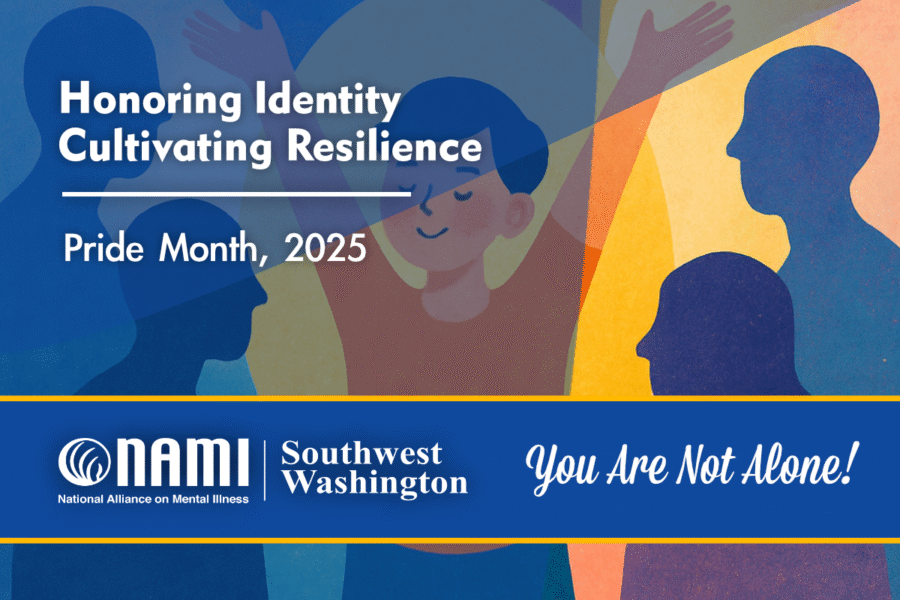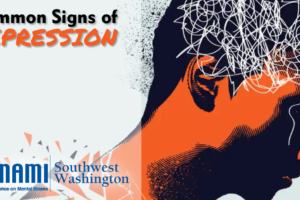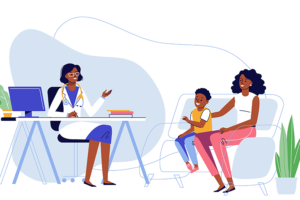By NAMI Southwest Washington
Pride Month is a time of celebration, recognition, and reflection. It’s a vibrant acknowledgment of the LGBTQIA+ community’s strength, diversity, and ongoing fight for equality. But beyond the parades and rainbow flags, Pride is also a powerful reminder of the emotional and mental strength it takes to live authentically in a world that has not always been accepting.
For many, embracing their identity is an act of courage in the face of social stigma, family rejection, and systemic barriers. That daily bravery can take a significant toll on mental health. Yet, it is also a testament to resilience. Pride Month is not only about visibility—it’s about honoring the emotional labor of being yourself, and creating space for healing, hope, and self-love.
Mental Health in the LGBTQIA+ Community
Members of the LGBTQIA+ community face unique mental health challenges. According to the National Alliance on Mental Illness (NAMI), LGBTQIA+ individuals are more than twice as likely to experience a mental health condition, including depression, anxiety, and suicidal ideation. These disparities are not due to identity itself, but rather the discrimination, rejection, and trauma that many individuals endure—especially when faced with systemic barriers and cultural invalidation.
Living with the fear of being misunderstood, mistreated, or rejected can take a toll on self-worth. Microaggressions, exclusion, and the constant need to self-censor can create an environment of chronic stress. When someone’s identity is challenged or invalidated by family, peers, institutions, or society at large, it can make maintaining mental wellness feel like a steep uphill battle.
Yet healing is possible. Through affirming community, trauma-informed support, and self-affirmation practices, individuals can begin to reclaim their sense of self-worth. Connecting with others who understand your journey can help rebuild confidence and resilience. Support groups, therapy, and storytelling spaces offer essential validation and serve as lifelines for those navigating identity in a world that still has work to do.
Alex’s Story:
Alex (they/them), a 27-year-old nonbinary artist, remembers the moment they first came out to their family. “It was terrifying. I was met with silence. Not anger, not rejection—just a void of understanding. I felt like I had disappeared in their eyes.”
That silence grew into isolation. For years, Alex struggled with anxiety and depression, constantly questioning their worth. “The world told me I should be ashamed. Even the people I loved didn’t know how to see me. I started to internalize it. I began to believe that maybe there was something wrong with me.”
They often found themselves retreating from social situations, declining invitations, and spending long hours alone in their apartment. The more they withdrew, the more distorted their self-image became. “I started believing I was too complicated, too much of a burden to be around. So I stopped reaching out. I convinced myself that people were better off without me.”
For a long time, Alex turned inward, expressing their emotions only through their artwork—abstract paintings filled with muted colors and fragmented forms. “It was the only way I could process what I was feeling,” they said. “But even then, I felt like I was painting invisibly, like no one could really see what I was trying to say.”
There were days when Alex would sit in front of a canvas for hours without making a single stroke, overwhelmed by a storm of emotions that felt too big to name. “I remember thinking, if I disappeared, would anyone notice?” But somewhere in the act of creating—no matter how small the effort—they found a thread of self-expression that refused to vanish entirely. It was that creative spark, however faint, that kept them tethered to the idea that connection was still possible.
Change began when Alex opened up to a small group of queer friends they met through an online art collective. “Just saying out loud how I was feeling changed something. I didn’t feel so invisible. They understood in a way no one else had. That support cracked something open. It made space for healing.”
Eventually, Alex joined a peer-led LGBTQIA+ mental health support group through NAMI. “That space saved my life. It reminded me I was not alone, and that my identity was not something to hide—it was something to honor. It gave me permission to rewrite the narrative I had been told about myself—and to write it with pride.”
Mental Wellness Tips for LGBTQIA+ Individuals
- Find Your People: Whether it’s online or in-person, seek out safe spaces and communities where you are affirmed and supported. Being part of a group that understands and accepts you can dramatically improve your mental health. These connections validate your experience and offer encouragement when times are tough. From local LGBTQIA+ centers to virtual chat groups, the support of others walking a similar path can be both healing and empowering.
- Speak Your Truth: Talking about your feelings can be a lifeline. Holding pain in silence can cause it to grow, but sharing your story with people who care can lighten the emotional load. Whether it’s a late-night text to a friend or a therapy session with someone affirming of your identity, verbalizing your emotions can create clarity and connection. Vulnerability takes courage—but it can also lead to deep healing.
- Set Boundaries: Protect your peace. It’s okay to step away from conversations or environments that drain your energy or challenge your identity. Setting clear boundaries is a radical act of self-care. This might mean limiting social media, declining events where you don’t feel safe, or simply saying “no” without guilt. Prioritize spaces and people who recognize your worth and support your mental wellness.
- Affirm Your Identity: Practice daily affirmations that honor who you are. This can be as simple as starting each morning by saying, “I am worthy, I am whole, I am enough.” Wear clothes that reflect your expression, engage in activities that bring joy, and celebrate small wins in your journey of self-acceptance. Affirming your identity helps undo internalized shame and builds a foundation of pride in your authentic self.
- Reach Out for Support: You do not have to navigate your mental health alone. There is incredible strength in seeking help. NAMI Southwest Washington offers free support groups, peer-led discussions, and educational programs that are inclusive and welcoming. Reaching out doesn’t mean you’re weak—it means you’re ready to heal. Let others walk alongside you; you are worthy of connection and care.
You Deserve to Feel Seen
This Pride Month, let us remember that mental health is part of our collective liberation. You deserve to feel seen, heard, and supported. Whether you are out and proud, questioning, or still finding your way, your identity is valid, and your mental health matters.
At NAMI Southwest Washington, we stand with the LGBTQIA+ community not just in June, but every day. We are here to offer connection, education, and compassionate support.
Because pride isn’t just about being who you are—it’s about loving who you are.




